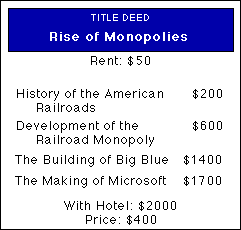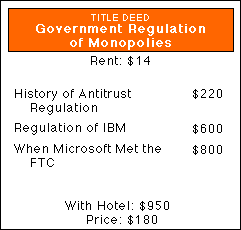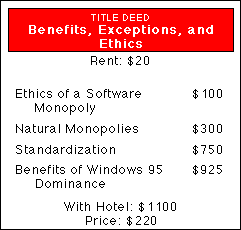
by
Andy Conigliaro
Joshua Elman
Jeremy Schreiber
Tony Small
"Get up! It's time for work!" Your Microsoft alarm clock screams at 4 AM. You quickly scramble to get out of bed but not fast enough as your clock screams again: "Don't be late again, or you'll get reported!" You go downstairs to get some breakfast but your old Microsoft Kitchen Cooker just doesn't work anymore. You can't afford a new cooker since the prices are sky-high and you can't go to the store and get food since the Microsoft stores only sell food that works with the later versions of the Kitchen Cooker. Still hungry, you leave your house and hear your house report "Left at 4:27. Six minutes late." Your Microsoft Home is reporting to your boss at work. You get in your old car with the Microsoft Traveler 1.2. It drives you to work, but gets stuck in the traffic jam on the highway since it doesn't have the latest traffic-avoidance feature found in Traveler 2.0, which you don't have because you can't afford the upgrade. You get to work late at the Microsoft CD factory, and find out that your pass key doesn't work. You see a message, "You are late. Your bills for the Microsoft Gas, Microsoft Food, and Microsoft Electricty are past due. You are fired." You turn around and curse the Microsoft monopoly that knows everything about you - you curse the monopoly that you cannot escape.
Microsoft may not control every aspect of your life, but with its growing dominance in a growing number of software and computer sectors, such pessimistic visions of a Microsoft-controlled life are not without grains of truth. This project explores the history, effects, ethics, and issues surrounding the corporate monopoly, with an emphasis on those monopolies in the software/telecommunications industries. Monopolies in such areas are especially intriguing because they are often in markets only years old, pushing existing laws and government standards into the dregs of obsolescence.
The project is divided into four categories. Rise of Monopolies explores the development of monopolies in three industries: railroads, computer hardware, and computer software. Government Regulation of Monopolies delves into the government's past and present role in curbing monopolies and ensuring free and competitive markets. Fears of Monopolistic Power deals with some of the dangers of monopolies with specific historical and current examples. Benefits, Exceptions, and Ethics explores the rationale behind certain monoplies, the potential benefits of a single company's market dominance, and the larger ethical issues involved.
Other Pages
These pages were developed as an assignment for Computers, Ethics, and Social Responsibility at Stanford University
Updated: June 10, 1996





